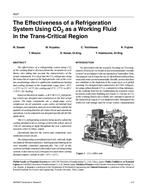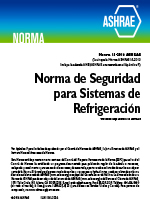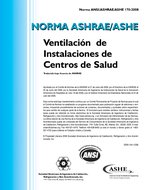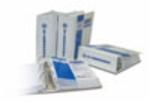Description
The effectiveness of a refrigerating system using CO2 as the working fluid is discussed from the viewpoint of cycle theory, also taking into account the characteristics of the actual components. It is clear that the CO2 refrigerator using the transcritical region at the high-pressure side of the cycle has an advantage when it is applied for simultaneous heating and cooling demand in the temperature range from -30°C (-22°F) to 5°C (41°F) for cooling and 25°C (77°F) to 80°C (176°F) for heating.
Based on theoretical studies, a 40 USRT CO2 refrigerating system was designed and constructed as the first actual system. The main components are a single-stage screw compressor, an oil separator, a gas cooler, an internal heat exchanger, an evaporator, and a receiver tank that controls the quantity of working fluid for all (transcritical and saturation) operations. Each component was designed specifically for this application.
This CO2 refrigerating system is being used to satisfy the cooling demand of an ice storage system with a floor area of 1500 m 2 operating at night throughout the year a university research center in Tokyo, Japan.
Operational data for the system and components were monitored closely on site.
The refrigerating system functioned well, with only slight mechanical vibration and noise. Starting up and shutting down were smoothly controlled automatically. The COP of this system is not high compared with similar types of refrigerating systems. It does not exceed 2.0 because it is used where cooling demand requires coolant at only -10°C (14°F).
Units: Dual
Citation: ASHRAE Transactions, vol. 108, pt. 1, Atlantic City, 2002
Product Details
- Published:
- 2002
- Number of Pages:
- 6
- File Size:
- 1 file , 430 KB
- Product Code(s):
- D-6977




